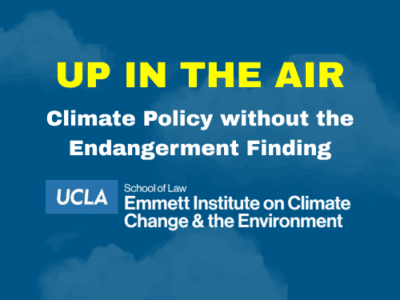OMB’s Dubious Claim to Regulatory Expertise
The head of OIRA – the Office of Information and Regulatory Affairs at OMB– is often called the White House’s regulation czar. OIRA is charged with reviewing the cost-benefit analysis of all major government regulations. This task is all about economics. Yet OIRA has never established the kind of reputation for economics expertise held by other governmental bodies like the Council of Economic Advisors, the Treasury Department, the Federal Reserve banks, or the Congressional Budget Office.
Interestingly, although the agency’s main job is supposedly economic analysis, none of the recent leaders of OIRA has actually been an economist. The current acting head of the office and the associate administrator are very smart, high-powered lawyers. (To be fair, one studied econ in college and the other probably picked up some economics as a public policy student.)
OIRA contrasts sharply with its sister office, the Council of Economic Advisors (CEA). CEA appointees are distinguished economists, and a stint working for CEA is often a stepping-stone into academic careers for young Ph.Ds from top programs. Or one might compare OIRA with the Fed, whose current head held an endowed chair in economics at Princeton.
What about OIRA’s staff? What are their credentials? Amazingly, OIRA doesn’t list its staff or provide any information about their credentials. This is not the norm. For instance, CEA provides such a listing. EPA also lists the economists who work for it, along with their specialties and backgrounds (and sometimes publications). For instance, one I picked at random has a Berkeley Ph.D and specializes in computable general equilibrium models. Is there anyone at OIRA with similar expertise? If not, how can OIRA really judge the quality of EPA’s cost-benefit analysis?
If we’re going to have economic review of regulations in the White House, it ought to be performed at a high level of professional competence. Ideally, so long as cost-benefit analysis remains central to OIRA’s role, the head of OIRA should have the same economics credentials as CEA. OIRA should also bring in staff economists from academia, as CEA does.
OIRA could also take a leaf from EPA’s efforts to improve its scientific credibility. Besides relying on its own staff, EPA is required to consult its Science Advisory Board on major regulations. We should have an Economics Advisory Board composed of top environmental economists to perform a similar function at OIRA.
If OIRA wants to have credibility as a guardian of economic rationality, it needs to demonstrate that it actually has the expertise to do its job well – at the very least, that OMB economists are as good as the ones at EPA whose work they review. Otherwise, it’s a little hard to take seriously OIRA’s claims of applying objective expertise to regulatory problems.
Reader Comments
2 Replies to “OMB’s Dubious Claim to Regulatory Expertise”
Comments are closed.







In my experience the real purpose of OIRA is to give the President some control over what his regulatory agencies are doing, either for political or policy reasons. The OMB analysis is just the fig leaf to justify the President’s decisions. I don’t think such Presidential control is all bad, since we don’t elect Cabinet officers or the lower level people (FAA, FDA, SSA, etc) who also have rulemaking authority. Every Department thinks its mission is the national mission (and the preambles to their legislative authority typically say so), and only the President can say whether Defense or Transportation or EPA should have the last word when their missions collide.
In my experience the real purpose of OIRA is to give the President some control over what his regulatory agencies are doing, either for political or policy reasons. The OMB analysis is just the fig leaf to justify the President’s decisions. I don’t think such Presidential control is all bad, since we don’t elect Cabinet officers or the lower level people (FAA, FDA, SSA, etc) who also have rulemaking authority. Every Department thinks its mission is the national mission (and the preambles to their legislative authority typically say so), and only the President can say whether Defense or Transportation or EPA should have the last word when their missions collide.